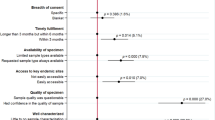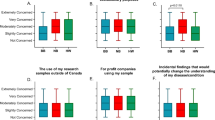Abstract
In the debate on biobank regulation, arguments often draw upon findings in surveys on public attitudes. However, surveys on willingness to participate in research may not always predict actual participation rates. We compared hypothetical willingness as estimated in 11 surveys conducted in Sweden, Iceland, United Kingdom, Ireland, United States and Singapore to factual participation rates in 12 biobank studies. Studies were matched by country and approximate time frame. Of 22 pairwise comparisons, 12 suggest that factual willingness to participate in biobank research is greater than hypothetical, six indicate the converse relationship, and four are inconclusive. Factual donors, in particular when recruited in health care or otherwise face-to-face with the researcher, are possibly motivated by factors that are less influential in a hypothetical context, such as altruism, trust, and sense of duty. The value of surveys in assessing factual willingness may thus be limited.
Similar content being viewed by others
Log in or create a free account to read this content
Gain free access to this article, as well as selected content from this journal and more on nature.com
or
References
Hansson MG : Ethics and biobanks. Br J Cancer 2009; 100: 8–12.
Kettis-Lindblad A, Ring L, Viberth E, Hansson MG : Genetic research and donation of tissue samples to biobanks. What do potential sample donors in the Swedish general public think? Eur J Public Health 2006; 16: 433–440.
Levitt M, Weldon S : A well placed trust?: Public perceptions of the governance of DNA databases. Crit Public Health 2005; 15: 311–321.
Caulfield T : Biobanks and Blanket Consent: the proper place of the public good and public perception rationales. King's Law Journal 2007; 18: 209–226.
Wendler D : One-time general consent for research on biological samples. Br Med J 2006; 332: 544–547.
Pardo R, Midden C, Miller JD : Attitudes toward biotechnology in the European Union. J Biotechnol 2002; 98: 9–24.
Johnsson L, Hansson MG, Eriksson S, Helgesson G : Patients' refusal to consent to storage and use of samples in Swedish biobanks: cross sectional study. Br Med J 2008; 337: a345.
Nilstun T, Hermeren G : Human tissue samples and ethics--attitudes of the general public in Sweden to biobank research. Med Health Care Philos 2006; 9: 81–86.
Gu∂mundsdóttir ML, Nordal S Iceland; in: Häyry M, Chadwick R, Árnason V, Árnason G (eds): The Ethics and Governance of Human Genetic Databases: European Perspectives. Cambridge: Cambridge University Press, 2007.
Hapgood R, McCabe C, Shickle D : Public Preferences for Participation in a Large DNA Cohort Study: A Discrete Choice Experiment: Sheffield Health Economics Group Discussion Paper Series. Sheffield: The University of Sheffield, School of Health and Related Research, 2004.
Cousins G, McGee H, Ring L et al: Public Perceptions of Biomedical Research: A Survey of the General Population in Ireland. Dublin: Health Research Board, 2005.
Pulley JM, Brace MM, Bernard GR, Masys DR : Attitudes and perceptions of patients towards methods of establishing a DNA biobank. Cell Tissue Bank 2008; 9: 55–65.
Wang SS, Fridinger F, Sheedy KM, Khoury MJ : Public attitudes regarding the donation and storage of blood specimens for genetic research. Community Genet 2001; 4: 18–26.
Kaufman D, Murphy J, Scott J, Hudson K : Subjects matter: a survey of public opinions about a large genetic cohort study. Genet Med 2008; 10: 831–839.
Wong ML, Chia KS, Yam WM, Teodoro GR, Lau KW : Willingness to donate blood samples for genetic research: a survey from a community in Singapore. Clin Genet 2004; 65: 45–51.
Bryant RJ, Harrison RF, Start RD et al: Ownership and uses of human tissue: what are the opinions of surgical in-patients? J Clin Pathol 2008; 61: 322–326.
Goodson ML, Vernon BG : A study of public opinion on the use of tissue samples from living subjects for clinical research. J Clin Pathol 2004; 57: 135–138.
Jack AL, Womack C : Why surgical patients do not donate tissue for commercial research: review of records. Br Med J 2003; 327: 262.
UK Biobank. Report of the Integrated Pilot Phase. Stockport: UK Biobank Coordinating Centre, 2006.
Kozlowski LT, Vogler GP, Vandenbergh DJ, Strasser AA, O'Connor RJ, Yost BA : Using a telephone survey to acquire genetic and behavioral data related to cigarette smoking in ‘made-anonymous’ and ‘registry’ samples. Am J Epidemiol 2002; 156: 68–77.
McCarty CA, Wilke RA, Giampietro PF, Wesbrook SD, Caldwell MD : Marshfield Clinic Personalized Medicine Research Project (PMRP): design, methods and recruitment for a large population-based biobank. Personalized Med 2005; 2: 49–79.
McQuillan GM, Pan Q, Porter KS : Consent for genetic research in a general population: an update on the National Health and Nutrition Examination Survey experience. Genet Med 2006; 8: 354–360.
McQuillan GM, Porter KS, Agelli M, Kington R : Consent for genetic research in a general population: the NHANES experience. Genet Med 2003; 5: 35–42.
Ford BM, Evans JS, Stoffel EM, Balmana J, Regan MM, Syngal S : Factors associated with enrollment in cancer genetics research. Cancer Epidemiol Biomarkers Prev 2006; 15: 1355–1359.
Rafnar T, Thorlacius S, Steingrimsson E et al: The Icelandic Cancer Project—a population-wide approach to studying cancer. Nat Rev Cancer 2004; 4: 488–492.
Tan CE, Emmanuel SC, Tan BY, Jacob E : Prevalence of diabetes and ethnic differences in cardiovascular risk factors. The 1992 Singapore National Health Survey. Diabetes Care 1999; 22: 241–247.
Cutter J, Tan BY, Chew SK : Levels of cardiovascular disease risk factors in Singapore following a national intervention programme. Bull World Health Organ 2001; 79: 908–915.
Human Genetics Commission: Public Attitudes to Human Genetic Information. London: Human Genetics Commission, 2001.
Wong ML, Chia KS, Wee S et al: Concerns over participation in genetic research among Malay-Muslims, Chinese and Indians in Singapore: a focus group study. Community Genet 2004; 7: 44–54.
Hoeyer K, Lynoe N : Motivating donors to genetic research? Anthropological reasons to rethink the role of informed consent. Med Health Care Philos 2006; 9: 13–23.
Dixon-Woods M, Wilson D, Jackson C, Cavers D, Pritchard-Jones K : Human Tissue and ‘the Public’: the case of childhood cancer tumour banking. BioSocieties 2008; 3: 57–80.
Ajzen I : Nature and operation of attitudes. Annu Rev Psychol 2001; 52: 27–58.
Acknowledgements
This study was conducted as part of the AutoCure and CCPRB projects of the EU Sixth Framework Programme. The authors of this study have been independent from the funders in both conception and execution of the study.
Author information
Authors and Affiliations
Corresponding author
Ethics declarations
Competing interests
The authors declare no conflict of interest.
Additional information
Author contributions
LJ, GH, SE, and MGH designed the study. LJ, TR, IH, and CKS collected the data. LJ analyzed the data and wrote the paper. All authors contributed to revision of critical intellectual content and approved the publication of the final version of this article.
Rights and permissions
About this article
Cite this article
Johnsson, L., Helgesson, G., Rafnar, T. et al. Hypothetical and factual willingness to participate in biobank research. Eur J Hum Genet 18, 1261–1264 (2010). https://doi.org/10.1038/ejhg.2010.106
Received:
Revised:
Accepted:
Published:
Issue date:
DOI: https://doi.org/10.1038/ejhg.2010.106
Keywords
This article is cited by
-
Get this thing out of my body! Factors determining consent for translational oncology research: a qualitative research
Journal of Translational Medicine (2023)
-
Public’s awareness of biobanks and willingness to participate in biobanking: the moderating role of social value orientation
Journal of Community Genetics (2023)
-
History of the largest global biobanks, ethical challenges, registration, and biological samples ownership
Journal of Public Health (2023)
-
Donation of discarded ocular tissue in patients undergoing SMILE laser refractive surgery: developing appropriate guidelines
Cell and Tissue Banking (2020)
-
Questioning the rhetoric of a ‘willing population’ in Finnish biobanking
Life Sciences, Society and Policy (2019)



